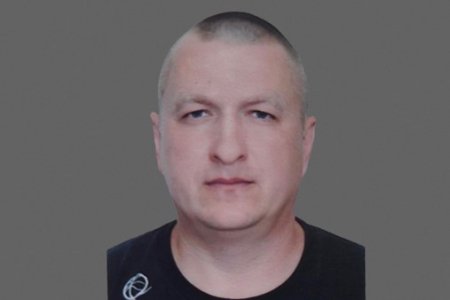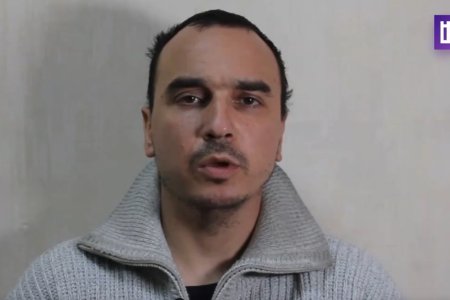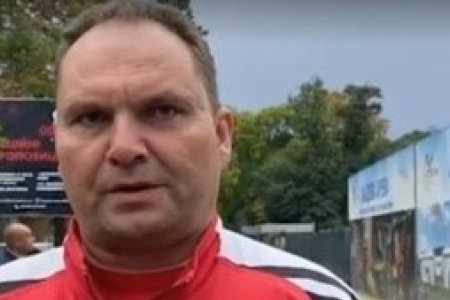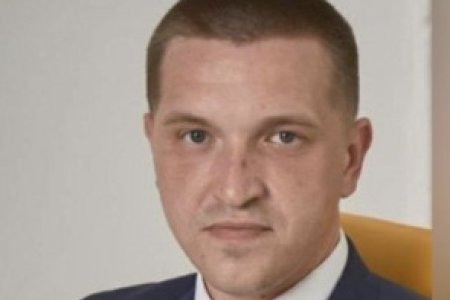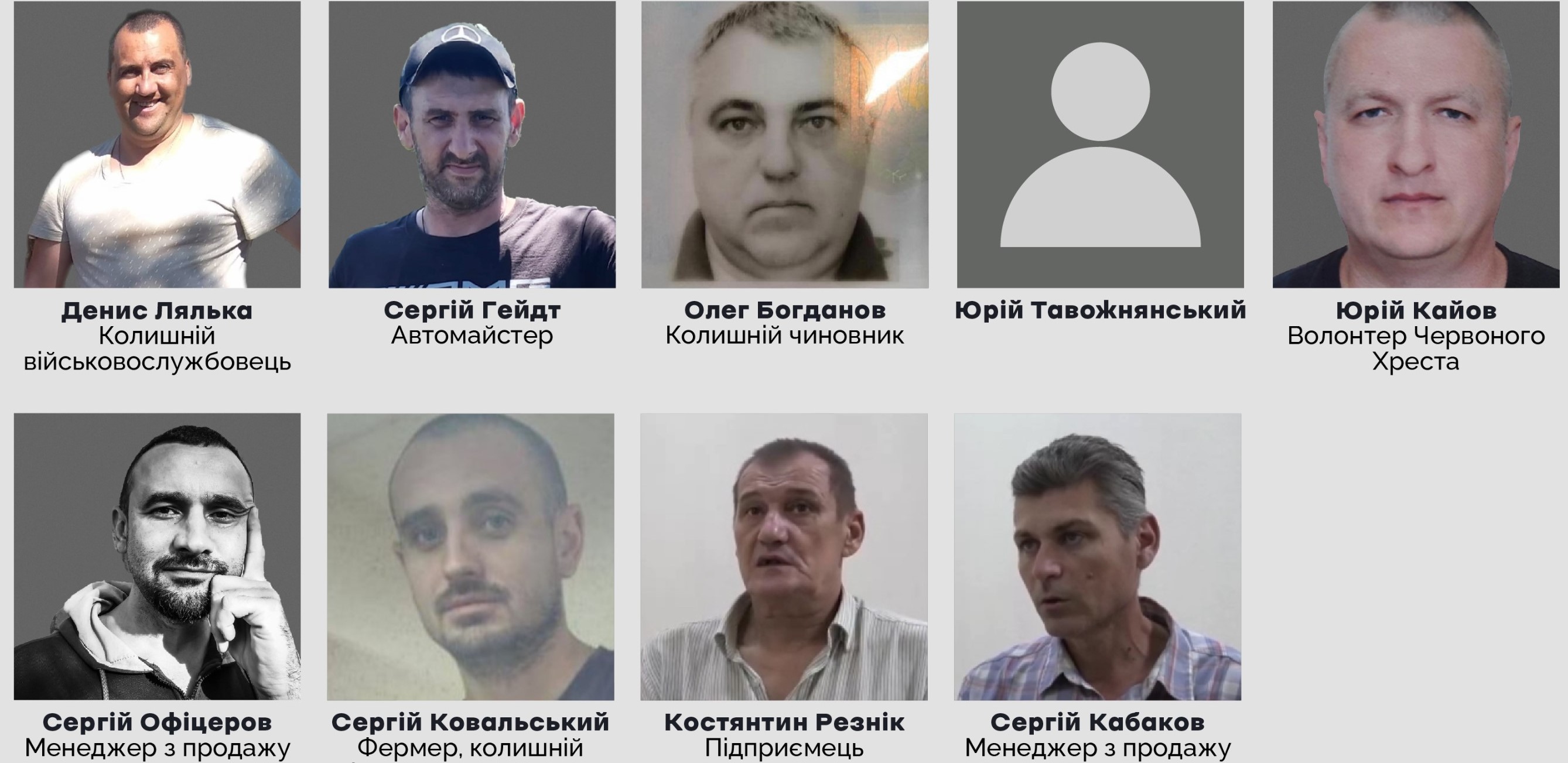
Russia is beginning a new show trial on surreal charges of nine Ukrainians abducted from occupied Kherson. It is likely that most of the men did not even know each other, and the only ‘evidence’ against them is based solely on ‘confessions’ which at least one of the men, Yuriy Kayov, has confirmed were extracted through savage torture.
The country which invaded and seized parts of Ukraine is claiming that the nine Ukrainians living in their own country were planning ‘an act of international terrorism’ and is illegally ‘trying’ them on Russian territory and under Russian legislation.
The nine men: Oleh Bohdanov; Serhiy Heidt; Serhiy Kabakov; Yuriy Kayov; Serhiy Kovalsy; Denys Lialka; Serhiy Ofitserov; Konstiantyn Reznik and Yuriy Tavozhniansky were seized by Russian soldiers at various times in July and August 2022. They were held incommunicado first in the illegal torture chambers that Russia set up in occupied Kherson, before being taken, first to occupied Crimea and then to the Lefortovo SIZO [pre-trial detention centre] in Moscow. All are charged with two counts of Article 361 § 1 (‘act of international terrorism’); Article 30 § 3 (an attempted crime) and Article 205.4 § 2 (participation in a terrorist society).
Russia introduced ‘acts of international terrorism’ to its criminal code back in 2016 but does not appear to have used it until after its full-scale invasion of Ukraine. An ’act of international terrorism’, according to Article 361, refers to an explosion, act of arson or other actions, committed outside Russia and jeopardizing the life, health, freedom or inviolability of Russian citizens “for the purpose of violating the peaceful co-existence of states and peoples, or aimed against the interests” of Russia. You can be convicted of such a purported ‘act’ even if nobody was killed or injured. If there were fatalities, then the minimum sentence rises from 10 to 15 years’ imprisonment, with up to life imprisonment envisaged. The scope for abuse of this charge is huge, as one can even be convicted under this article for “a threat to commit such actions”, with such a ‘threat’ likely to be backed solely by ‘evidence’ or ‘testimony’ obtained by the FSB while a person was under their total control and without access to a lawyer.
It seems likely that these charges are those first reported in connection with Yuriy Kayov. Most is known about the torture he endured thanks to an interview he was able to give, via his lawyer, to the independent publication Verstka and to the efforts of his wife, Olha.
The FSB accuse Kayov and eight other men of an unsuccessful assassination attempt against Kyrylo Stremousov, a Ukrainian collaborator installed by the Russians as so-called ‘deputy head of the military-civic administration’ in occupied parts of Kherson oblast. Stremousov was killed three months later on 9 November 2022, two days before the liberation of Kherson.
The men’s ‘arrests’ would appear to have been on 8 November 2022, the day before Stremousov was killed, and a full three months after the purported assassination attempt. The Russian state-controlled RIA Novosti claimed that “SBU [Ukrainian Security Service] saboteurs” had been detained, with the FSB claiming that Kayov and his alleged accomplices had joined a ‘sabotage gang created by SBU officer Samir Shukorov on 5 August that year and that they had received instructions to blow up Stremousov’s car. According to the FSB, Kayov was supposed to prepare a homemade explosive device, filled with bolts. Russia will presumably try to justify its absurd claim that an unproven attempt on the life of a collaborator constituted an ‘act of international terrorism’ by asserting that the attempt might have killed civilians, however any Russians wandering around occupied Kherson were there as actors in Russia’s war of aggression against Ukraine.
Yuriy Kayov is 41 and an engineering technician by profession, but had, however, worked with a friend in retail. He and Olha have two teenaged children who have not seen their father for a year and a half.
Like many other Kherson residents, Kayov helped patrol the district after Russia’s full-scale invasion. In May 2022, he officially became a volunteer, working under the auspices of the Ukrainian Red Cross, getting humanitarian aid – food, medicines – from Zaporizhzhia to hospitals, etc. in occupied Kherson. According to his wife, he also helped evacuate people who urgently needed medical assistance.
Olha learned from one of her husband’s colleagues that Yuriy was seized on 5 August 2022, when he and other volunteers had stopped for the night in the village of Skelki. Neighbours later told her that the Russians had also ‘searched’ their home and had stolen her father’s car which they were holding for him.
It was only on 6 October 2022 that the FSB formally admitted that Kayov was in their custody, and he was provided with an appointed lawyer who contacted his family.
Kayov himself has confirmed to Verstka that he was subjected to savage torture during the two months before Russia admitted to his captivity (details here).
Serhiy Ofitserov is 47 and from Kherson. He was abducted from his father’s home on 3 August 2022, and, like the others, finally taken to Lefortovo Prison.
Ofitserov actually has Russian citizenship, but this is only because he turned 16, the age for obtaining a passport, while his parents were working in Kamchatka. His pro-Ukrainian position became particularly pronounced in 2014, and for three years before the full-scale invasion, he had tried to renounce his Russian citizenship, but kept running up against Russian bureaucracy.
Hennadiy Ofitserov learned soon after his son’s abduction that the Russians had carried out a search of Serhiy’s apartment. Serhiy’s mother, Iryna Kovalska, told the Media Initiative for Human Rights [MIHR] that the Russians had arrived at their home, with Serhiy looking very obviously beaten, several times. As with Kayov, it was only in October that the Russians admitted to holding Serhiy Ofitserov, first in occupied Crimea, then in Moscow, at Lefortovo.
Serhiy Kovalsky (b. 18.07.1990), is a farmer and a former military serviceman. He is also Serhiy Ofitserov’s nephew and was abducted on the same day.
Denys Lialka (08.08.1988) had served in the Ukrainian Armed Forces for the past two years, but his contract had expired just before the full-scale invasion. He was seized on 14 July 2022.
Serhiy Heidt (12.05.1981) is a car mechanic who was abducted on 19 July 2022.
Oleh Bohdanov, 30.11.1972; is a former public official.
Kostiantyn Reznik 02.07.1964 is a businessman. He was abducted by the Russians in Kherson on 21 July 2022.
Serhiy Kabakov (18.01.1974) is a sales manager who was abducted around the same time as Reznik. In February 2023, MIHR reported that a lawyer had contacted Kabakov’s family and said that he was unwilling to communicate. Both men have been shown on Russian propaganda videos, with any such ‘confessions’ doubtless obtained through torture (and the threat that it will be continued).
Yuriy Tavozhniansky 20.01.1980. Nothing seems to be known about him, except that Verstka did receive information about his date of both, so he clear was held at Lefortovo and he is on the list of nine defendants in the ‘trial’ due to begin on 25 January 2024 at the Southern District Military Court in Rostov. This ‘court’ has been passing politically motivated sentences against Ukrainians since 2015 and, unfortunately, there are no grounds for expecting any semblance of a fair trial. The charges carry sentences of 10-20 years or, potentially, life imprisonment.
